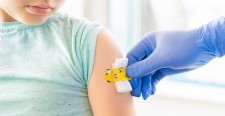Pneumococcal vaccine
There are two kinds of vaccine to protect your children from pneumococcal infections:
- The pneumococcal conjugate vaccine protects against the most common kinds of pneumococci bacteria. It’s recommended for all infants and children starting at 2 months of age. It contains 10 or 13 types of pneumcoccus.
- The pneumococcal polysaccharide vaccine contains 23 types of pneumococcus. It is recommended for children 2 years of age or older who have serious medical problems that make them likely to have serious pneumococcal disease.
- Your child will need both vaccines if they have:
- a weak immune system
- a spleen that is missing or not functioning well
- chronic heart, lung, kidney or liver disease
- a neurologic condition that causes aspiration of oral secretions and/or impairs clearance of respiratory secretions
- a cerebrospinal fluid (CSF) leak
- diabetes
- is deaf and has, or will have, an implant to help with hearing
How do I we get the vaccine?
In Canada, all provinces and territories provide the pneumococcal conjugate vaccine, starting at 2 months of age. While the exact schedule will depend on where you live, usually two shots are given between 2 and 11 months of age and a booster at 12-15 months. Children at high risk of disease are given three shots (at 2, 4 and 6 months), as well as the booster.
Unvaccinated children between 15 months and 5 years old should also get the vaccine. Your doctor or public health unit can tell you the number of shots your child will need and when.
All unvaccinated children and adolescents who are at high risk of serious infection should receive both the conjugate and the polysaccharide vaccine. The polysaccharide vaccine is at given at age 2 or later, with a booster 5 years after the first.
How safe is the pneumococcal vaccine?
- Both vaccines are very safe.
- As with any vaccine, there may be some redness or soreness where the needle went into the arm or leg.
- Some children will have a mild fever after getting the vaccine.
Who should NOT get the pneumococcal vaccine?
People who have had a serious allergic reaction to a previous dose of the vaccine (swelling of the face or lips, difficulty breathing or if your blood pressure drops) should not get it again unless seen by a specialist and vaccinated in a special clinic that can control severe reactions.
Reviewed by the following CPS committees
- Infectious Diseases and Immunization Committee
Last updated: August 2021

